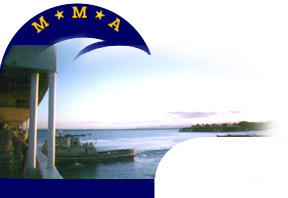
Captain's Log for Monday 31 January, 2000
|
As of 0700 Eastern Standard time, 1200 GMT and 1400 ship time, the Empire State was enroute to Barcelona, Spain and located at 36 degrees 46 minutes North Latitude, 23 degrees 41 minutes East Longitude. We were steering a course of 182 degrees making good a speed of 16 kts. That puts the ship approximately 10 miles east of Nisis Falkonera. The weather was clear, with winds out of the northwest at 3 knots. Seas were only 3 to 6 feet and the ship was riding nicely. The air temp was 64 degrees and the sea temp was 58 degrees. Barometric pressure was 1026 millibars of mercury. Depth of water beneath the keel: 315 Meters. CAPTAIN'S LOG Athens is positively eternal. To slowly wind your way up the long, marble walkway to the Acropolis is to step backward in time. In the shadow of Ionic, Doric and Corinthian columns, carved by human hands over 2,500 years ago, one can almost hear impassioned speeches given so long ago by ancient, white robed Athenians. I suspect that modern day Greeks, whirling about on their motor scooters and taxis forget the history, but for the tourist, the experience hits right between the eyes. 500 BC was a long time ago! I first visited the Acropolis in 1966 as a high school student and little has changed since. Scaffolding is perpetually in place as archeologists continue to mend fractured marble walls and columns, making neat piles of identifiable rubble that may some day fit into the puzzle left by Turkish and Spartan destruction. Some areas that were once accessible to tourism are now fenced off in an attempt to reduce human wear on the precious framework. Occasionally, one sees archeologists precisely measuring and comparing distances between points on the structures in an effort to detect subtle but destructive movements in the foundations. The partial replica roof, once planned for the Parthenon, lies neatly on the ground. The project was abandoned after the earthquake of 1991 weakened that structure. The replica statues that adorn the temples have weathered nicely and hint of the real thing Our visit into Greece and sauntering through the ancient past were moving experiences for me and the highlight of the Sea Term for the cadets. You will never hear us say: "Oh the Acropolis, yeah, I've been there and done that." One personal observation; Despite the predictable decay of the man made structures, the ancient olive trees growing on Mount Olympus, continue to thrive. Mankind's living testament to peace has endured too many wars. We sailed from this maritime Mecca early this morning under beautiful cloudless skies on ripple free seas. Cadets and crew alike lined the rails and stared wistfully shoreward as we skirted the ancient Greek Islands, passed into the Med and turned westward toward home. The cruise is now half over. In fact, yesterday was the official "over the hump day" and we have nearly exhausted our inport time; only Barcelona remains. ("Exhausted" is the operative word after our hectic pace in Piraeus.) But with our westerly advance, we regain those hours lost to the easterly transit; the clocks will again make sense and dreams of returning home will begin to wake us. See you tomorrow. QUESTIONS FOR TUESDAY 01 FEBRUARY 2000 GEOGRAPHY: The Empire State is now headed for Spain. Spain occupies 85% of what peninsula? SCIENCE: In this century, the earth's average temperature has warmed slightly and seas along much of the United States' coastal regions have risen as much as a foot. Sea level rises over a period of time are one side effect of what phenomenon? HISTORY: Spain amassed tremendous wealth and a vast colonial empire through the conquest of Peru and Mexico. However, Spain lost its position as the most powerful empire in the world when it attempted to invade what country? MATH: Cadet Hegarty is working in the galley and must distribute a nine-inch pie equally among 8 cadets. At what angle at the center, must she cut each piece? ANSWERS FOR MONDAY 31 JANUARY 2000 GEOGRAPHY: Athens SCIENCE: The blue fin tuna. Blue fin tuna are among the largest and fastest marine fish. An adult may weigh 1,500 pounds and swim up to 55 miles per hour. HISTORY: In 1460, after the fall of the Byzantine Empire, of which Greece was a substantial part, Greece became a Turkish province, and remained one for the next four-hundred-years. MATH: $426.90
|
|
|||||||||||||||||||||||||||||||||||||||||||||||||||||||||